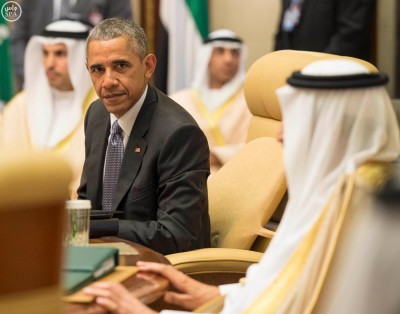President Obama vetoed the Justice Against Sponsors of Terrorism Act (JASTA) on Friday, setting up an expected showdown with Congress over the controversial bill that would open up foreign nations to lawsuits in the United States.
In a thoughtful letter to Congress attached to the veto, President Obama says that while he has deep sympathy for the victims of the attacks, JASTA “threatens to reduce the effectiveness of our response to indications that a foreign government has taken steps outside of our borders to provide support for terrorism, by taking such matters out of the hands of national security and foreign policy professionals and placing them in the hands of private litigants and courts.”

President Obama in Riyadh, Saudi Arabia.
Any state-sponsored terrorist attacks, the President argued, required a “unified Federal Government response.”
“In contrast, JASTA departs from longstanding standards and practices under our Foreign Sovereign Immunities Act and threatens to strip all foreign governments of immunity from judicial process in the United States based solely upon allegations by private litigants that an overseas government had some role or connection to a group or person that carried out a terrorist attack inside the United States.”
Despite the strong case laid out by President Obama for his veto, it remains an uphill battle for opponents of the legislation in Congress.
As Politico reports today, it’s still “almost a certain bet” that Congress will override Obama’s veto. However, a new “Dear Colleague” letter from Rep. Adam Smith (D-Washington) “shows opposition is starting to form publicly, at least in some corners of the Capitol.” Smith echoed the President’s arguments in the letter.
Some Senate Democrats on Capitol Hill continue to consider their votes on the Justice Against Sponsors of Terrorism Act (JASTA) and, according to some reports, are “starting to show cracks in their support” of the legislation after efforts by the Obama administration to convey the risk of the bill’s potential international relations fallout.
The European Union also voiced opposition to the bill. “The possible adoption and implementation of the (bill) would be in conflict with fundamental principles of international law and in particular the principle of State sovereign immunity,” the European Union delegation to the United States said in a letter to the U.S. Department of State, seen and reported by Reuters.
But efforts to build a coalition against the bill were late to take form in Washington, as evidenced by the fact that the bill passed unanimously by voice vote in both the House and the Senate. The legislation has taken several forms over the past few years until it finally garnered the votes needed to pass in this heated election year in the United States.









